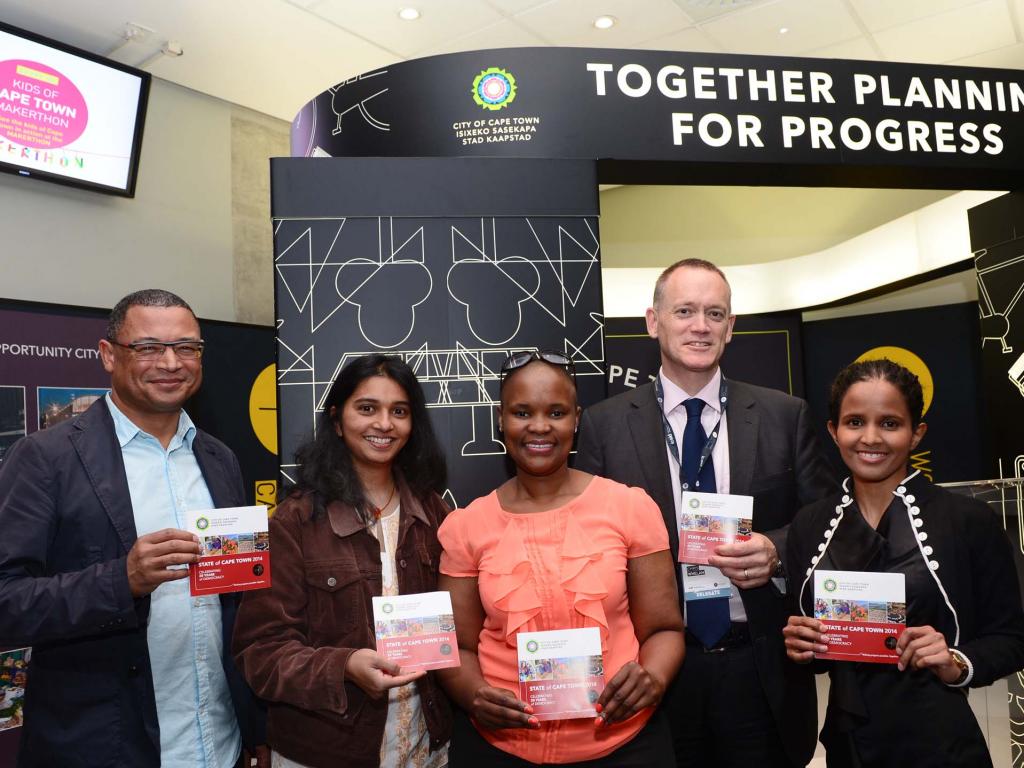Changing society, one student at a time


Dr Khosi Kubeka (pictured above, centre) was honoured at the launch of the City of Cape Town's Research Report for her work on Youth Identity Formation
Dr. Khosi Kubeka is a young academic on a mission! She is a qualified Social Worker and lecturer in the Department of Social Development and, she is also part of a generation of black and talented researchers who are challenging the status quo and shifting the boundaries of teaching in the classroom. After obtaining her Bachelor of Social Work degree from the University of Cape Town in 1999, she continued on to postgraduate study at Stellenbosch and thereafter the Ohio State University in the United States where she completed a Masters degree and PhD in Sociology. She returned to UCT in 2010 to work as an AW Mellon Post-Doctoral Research Fellow.
Fast forward to 2014 and Khosi has now completed the New Academic Practitioners' Programme (NAPP), a professional development programme designed for new lecturers at UCT. Khosi is extremely passionate about empowerment, she loves to teach and enjoys nothing more than challenging her students to be better. Humanities News spoke to this high achiever to find out exactly what makes her tick…
HN: What informed the decision to pursue a career in Social Work?
KK: in the beginning I must say it was for selfish reasons. Back then my motivation was to get educated so I can live a comfortable life. I saw how my family was struggling financially and was determined to live a better life. I saw education as the key to accessing that better life. When I arrived at university however, my view expanded. I was learning a lot and wanted to learn more. After graduating with my Bachelors’ degree I decided to study further and enrolled for a Masters and a PhD.
HN: In your opinion, what are some of the key issues facing South African society today?
KK: I am concerned about the plight of youth in our country. They face so many challenges as they navigate life and are transitioning to adulthood. They also have immense potential that we need to tap into. I believe we need to tune into that. We can start by listening and hearing what these young people have to say and contribute to the development of our country. I love interacting with the youth, especially my students. I learn so much from them. They are passionate, intelligent and articulate. They just need someone to believe in them and help them see and embrace their power. They need help in cultivating a solid sense of identity.
HN: There appear to be more women in the field of social work than men. What should prospective male applicants know that could change their perceptions?
KK: There has been an increase in males who are keen to join the profession. I would tell them the Social Work profession provides one with an opportunity to transform the lives of others and it opens up a lot of doors if one wants to pursue other careers. I know a lot of people who have become CEOs and Directors with Social Work degrees.
HN: What are the core lessons you strive to inculcate within your students?
KK: I always emphasize the importance of further education. I tell my students to use the opportunities they have at their disposal while they are still young. I tell them that the world is becoming more and more competitive and having a bachelor’s degree may not be enough these days.
HN: If your students were asked to describe your teaching style, what would they say?
KK: They would say I am passionate about what I do. I believe that a classroom is a sacred space for interaction, exchange of ideas, forging relationships and learning through dialogue with students. My role as a teacher is to facilitate the process in a supportive manner. My mission is to enable the students to tap into their infinite potential and to develop the capacity to listen and learn from each other. Therefore, the teaching methods that I use have to encourage dialogue and interaction, a safe space for students to share their views in a respectful, affirming and supportive manner as they engage with the course material.
HN: Congratulations on completing the NAPP programme at UCT! How will this add value in your teaching?
KK: The experience has definitely affirmed me as an educator. I have been teaching for a long time and it was great to get the opportunity to pause and reflect on my teaching and determine what I can do to improve it in a safe and supportive space. The experience has also made me aware of the incredible support and resources we have available at this institution as academics. We are truly fortunate. I was also fortunate to meet other academics who are equally passionate about teaching. This was refreshing.
HN: Your work on Youth Identity Formation has been featured in the 2014 City of Cape Town Research Report. How did this collaboration come about?
KK: It’s the beginning of a great journey for myself as an up and coming academic. It is my goal to continue doing more and more research in the area of youth identity formation. The opportunity to write for the City of Cape was presented to me by my Head of the Department Associate Professor Viviene Taylor. In my field, engaging with the government and other organizations working on issues of social development is key. It is part of social responsiveness and its about creating value in and transforming our communities.
HN: What does Dr. Khosi Kubeka do in her down time?
KK: She reads a lot. I am currently reading about four books at the same time. I am reading Xolelwa Mangcu’s Biko, a Biography and his latest offering The Arrogance of Power: South Africa's Leadership Meltdown. I also enjoy watching movies and hosting dinner parties with friends. I practise Buddhism and I enjoy spending time within this community.